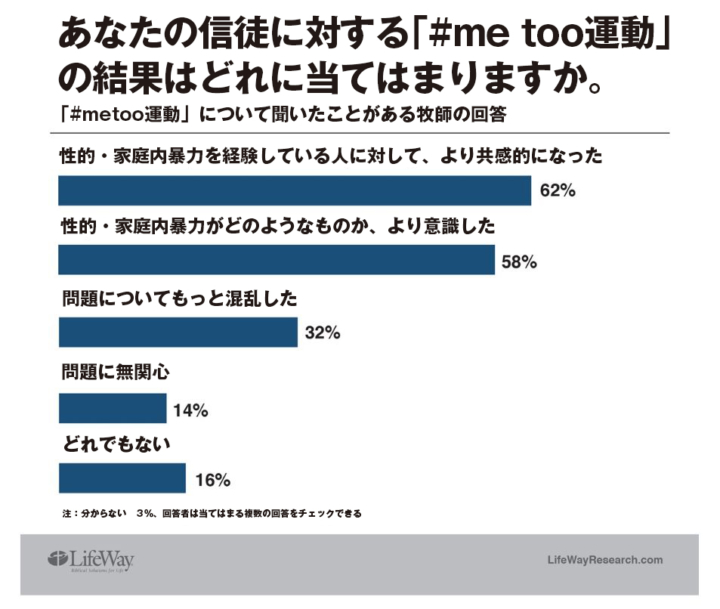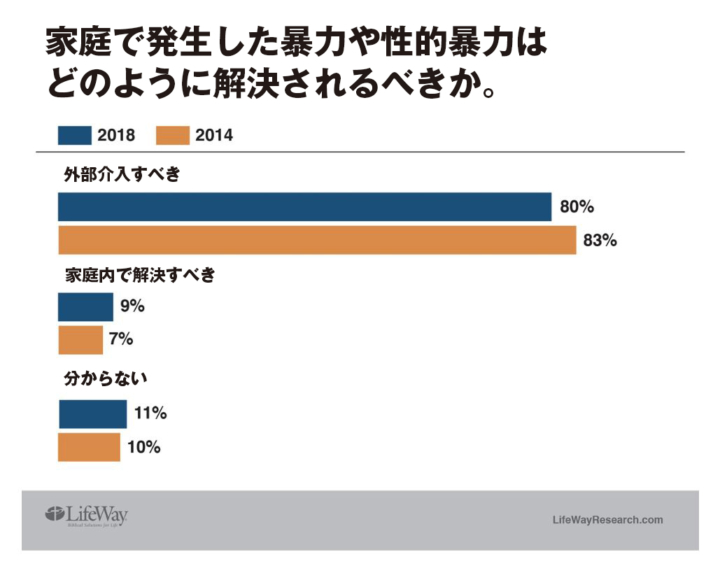家庭内暴力を語ることはタブーではない
[toggle]Domestic abuse less taboo[/toggle]ライフ・ウェイ・リサーチはこの調査のため、性的・家庭内暴力の話題をどう扱うかについて、一連の詳細な質問を牧師にした。
[toggle]For the study, LifeWay Research asked Protestant pastors a series of detailed questions about how they handle the topics of sexual and domestic abuse. [/toggle]「少なくとも年に1回は家庭内暴力について話している」と回答したのは77%。そこには、「年に一度は話す」(26%)、「年に一度以上話す」(51%)も含まれる。
[toggle]Three-quarters (77%) say they speak about domestic violence at least once a year. That includes 26 percent who speak about it once a year and 51 percent who speak about it more than once a year. [/toggle]
2014年の同じの調査では、年に1回以上、家庭内暴力について話したのは、主任牧師のわずか34%だ。
[toggle]By contrast, only 34 percent of Protestant senior pastors spoke about domestic violence more than once a year in a similar study in 2014. [/toggle]少なくとも年に1回以上は性的・家庭内暴力に対処している牧師(75%)は、「直接、暴力の痕(あと)を目にしたことがあるので、そうしている」と答えた。また、「性的・家庭内暴力は自分たちのコミュニティーの問題」(87%)、「被害者を助けるための方策を知っている」(96%)と回答している。
[toggle]Many pastors (75%) who address sexual or domestic violence at least once a year or more say they do so because they have seen the impact of such violence firsthand. Eighty-seven percent say sexual or domestic violence is an issue in their community. Ninety-six percent know of resources to help victims. [/toggle]「自分の信徒の問題であるため、家庭内暴力や性暴力に対処している」と回答したのは5人に1人(18%)だけ。ほぼ半数(46%)が、「家庭内暴力の問題について学んでいる」と回答した。
[toggle]Only 1 in 5 (18%) say they address domestic or sexual violence because it is an issue in their congregation. Almost half (46%) speak about it because they have been trained in domestic violence issues. [/toggle]性的・家庭内暴力に対処していない牧師は、「自分の信徒の問題ではない」(46%)、「他のトピックのほうがより重要」(29%)、「問題を十分に知らない」(19%)、「自分たちのコミュニティーの問題ではない」(19%)、「性的・家庭内暴力に公に取り組むのは適切ではない」(16%)と答えた。
[toggle]Almost half (46%) of pastors who don’t address sexual or domestic violence say it is not an issue in their congregation. Twenty-nine percent say other topics are more important. Nineteen percent say they don’t know the issue well enough. Nineteen percent also say it is not an issue in their community. Sixteen percent say it is not appropriate to address domestic or sexual violence publicly. [/toggle]この問題がこれほど社会に浸透しているにもかかわらず、牧師の5人に1人しか、性的・家庭内暴力に対処する必要性を感じていない。
[toggle] “Despite the widespread public conversation, 1 in 5 pastors don’t feel compelled to address domestic or sexual violence,” McConnell said. [/toggle]とるべき行動
[toggle]Action steps[/toggle]牧師が性的・家庭内暴力の実際のケースについて学ぶと、行動を起こす場合が多いことをライフ・ウェイ・リサーチは発見した。
[toggle]LifeWay Research found that pastors often take action when they learn about cases of domestic and sexual violence. [/toggle]家庭で虐待が発生した場合、「被害者は外部からの援助を必要としている」と牧師は考えている。身体的暴力、児童虐待、配偶者間のレイプなど、家庭内で発生する性的・家庭内暴力の場合、「外部介入すべき」と回答したのは80%。また、「家庭内で解決すべき」と答えたのは9%、「分からない」は11%だった。
[toggle]Pastors believe victims need help from outside of their families when abuse occurs in the home. Eighty percent say in cases of domestic or sexual violence that occur in the home—including physical violence, child abuse, or marital rape—outside intervention is needed. Nine percent say such violence should be resolved primarily within the family. Eleven percent don’t know. [/toggle]
家庭内暴力の場合、「家庭内虐待の専門家からの支援を求めるよう被害者に勧める」と回答したのは主任牧師の82%。「被害者に対して、配偶者との関係を改善させようとする」は8%。「被害者に何をすべきか助言の仕方が分からない」は10%だった。
[toggle]In cases of domestic violence, 82 percent of Protestant senior pastors say they would counsel a victim to seek support from a domestic abuse expert. Eight percent say they would tell a victim to try and improve the relationship with their spouse. Ten percent don’t know what they would counsel a victim to do. [/toggle]「性的・家庭内暴力が信徒の間で起きている」というのは牧師の64%。「起こっていない」は30%(強く否定している13%を含む)。「家庭内暴力や性的虐待に対して、少なくとも年に1回、教会は何かしらの行動を起こしている」と回答したのは62%だ。
[toggle]Sixty-four percent of pastors agree that sexual or domestic violence occurs in the lives of people in their congregation—including 24 percent who strongly agree. Thirty percent disagree—including 13 percent who strongly disagree. Sixty-two percent say their church has taken action against domestic or sexual abuse at least once a year. [/toggle]「性的・家庭内暴力の兆候が見られた場合、虐待の可能性について教会員に尋ねる責任がある」と述べたのは牧師の96%。3%は、それに賛同していない。
[toggle]Ninety-six percent of pastors say they have a responsibility to ask church members about possible abuse if they see signs of domestic or sexual violence. Three percent disagree. [/toggle]性的・家庭内暴力事件に対応する際、「被害者を支援する機関に紹介した」と回答したのは81%。「結婚やカップルのカウンセリングを行った」のは70%。「虐待者にカウンセリングを行った」のは46%。「被害者の安全を守るための危険度評価を行った」のは40%。
[toggle]When responding to a case of domestic or sexual violence, 81 percent of pastors say they have provided a referral to an agency that assists victims. Seventy percent have provided marriage or couple’s counseling. Forty-six percent provided counseling for the abuser. Forty percent did a safety risk assessment for the victim. [/toggle]多くの牧師は「被害者を助けたい」と思っているにもかかわらず、「まだ準備が整っていない」と感じているようだ。
[toggle]Despite their willingness to help, many pastors still feel ill-prepared according to the study. [/toggle]「地元の家庭内暴力への方策に精通している」、「たいへん精通している」と回答したのは牧師の約半数(55%)だけ。そして半数は、「性的虐待や家庭内虐待に対処するのに十分な訓練を受けていない」と回答した。
[toggle]Only about half (55%) of pastors say they are familiar or very familiar with domestic violence resources in their community. And half say they don’t have sufficient training to address sexual or domestic abuse. [/toggle]「牧師は、家庭内・性暴力の被害者の世話をしたいのです。そして、犠牲者の世話をするために呼ばれるのですが、結局どうすればいいのか分からないことがしばしば」とマッコネル氏。
[toggle] “Pastors want to care for victims of domestic and sexual violence,” McConnell said. “And they are often called to care for victims. But they don’t always know what to do.” [/toggle]「また、彼らの対応の仕方によっては、助けるどころか被害を拡大することもあります」
[toggle]And some of the ways they respond can cause more harm than good according to experts, said McConnell. [/toggle]「専門家の見解によると、被害者に最初にすべきことは安全な場所の提供。にもかかわらず、半数近くの牧師がひとりよがりな判断をしています。そして、暴力に対応してカップルにカウンセリングを行い、被害者をより危険な状況にさらしてしまう牧師が多い」
[toggle]Domestic violence experts, for example, say providing safety for victims should come first. Yet, less than half of pastors have done an assessment. And many pastors provide couples counseling in response to violence, something experts say can put victims at risk, said McConnell. [/toggle]「思いやりのある信仰の友同士が必要に応じて支え合うことを私たちは知っています。しかし、虐待と嫌がらせの対応にはまだ多くの課題が残っています。次世代の信仰指導者は、それらの問題を防ぐための説教をし、教会内に安全な場所を作り、社会の永続的な変化のために声を上げ続けなければならりません」とIMA世界保健代表のリック・サントス氏は言う。
[toggle] “We know caring faith communities respond to need. But in responding to abuse and harassment, we have much work left to do,” said Rick Santos, president and CEO of IMA World Health. “Our next generation of faith leaders need to be prepared to preach about prevention from the pulpit, create a safe space within their churches and lend their voices to the movement for lasting change in our society.” [/toggle]調査方法
[toggle]Methodology: [/toggle]2018年6月19日から7月2日にかけて、1000人の牧師に電話調査を行った。この調査はIMA世界保健とソージャナーズが後援した。電話リストは、すべてのプロテスタント教会からランダムに選ばれた。各インタビューは、呼び出しに応じた主任牧師や牧師に行われた。人口をより正確に反映するよう、回答を地域別に分けた。完成したサンプルは1000人からの調査だ。サンプルは、誤差がプラス・マイナス3・2%を超えない95%の信頼度がある。
[toggle]The phone survey of 1,000 Protestant pastors was conducted June 19-July 2, 2018. The study was sponsored by IMA World Health and Sojourners. The calling list was a stratified random sample, drawn from a list of all Protestant churches. Quotas were used for church size. Each interview was conducted with the senior pastor, minister or priest of the church called. Responses were weighted by region to more accurately reflect the population. The completed sample is 1,000 surveys. The sample provides 95 percent confidence that the sampling error does not exceed plus or minus 3.2 percent. Margins of error are higher in sub-groups. [/toggle]ライフ・ウェイ・リサーチが同じ調査方法で2014年5月7〜31日に実施した1000人の牧師への電話調査と比較している。
[toggle]Comparisons are made to a phone survey of 1,000 Protestant pastors conducted by LifeWay Research May 7-31, 2014 using the same methodology. [/toggle]ライフ・ウェイ・リサーチは、ナッシュビルを拠点とする福音派の調査会社で、文化の中の信仰や、教会に影響を与える問題についての調査を専門としている。
[toggle]LifeWay Research is a Nashville-based, evangelical research firm that specializes in surveys about faith in culture and matters that affect churches. [/toggle]執筆:ボブ・ミエタナ
本記事は「クリスチャニティー・トゥデイ」(米国)より翻訳、転載しました。翻訳にあたって、多少の省略をしています。
